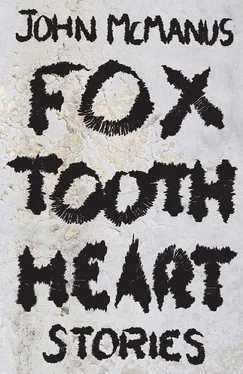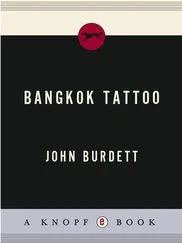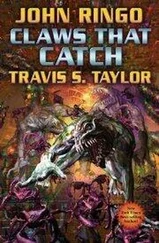“You’ll get stranded,” said a waitress, slightly pretty, her hair the color they called dishwater. She had no supposed neutrality to put to a test; still, folks all reacted one way or the other, and Jeremy liked to know where he stood.
“Is there a school or church nearby?”
“Doubt it. We’re downtown. Why?”
“I’m twenty-five, my ex is twenty-two, and it was seven years ago.”
She tapped at her order pad as if waiting for the point.
“Have you heard of the Georgia Sex Offender Law?”
“Oh, okay,” she said.
“When Melissa’s dad found out, she was applying to this summer program at the University of Seville. He decided I must have brainwashed her into going there, because you know what Spain’s age of consent is?”
The waitress shook her head. “Thirteen,” Jeremy said, not to prove a point but to state a fact. If she thought he meant that it sounded nice, that age, she could join the queue. He paid and left. Walking on, he luxuriated in the cold. Drifts on the east side of the street came as high as his knees.
At Turner Field his mother phoned. “Jeremy, are you inside?”
“I’m at work in a warm building.”
“You’ll catch cold.”
“No smoke breaks, remember? I quit.”
“I’m immunocompromised, you know.”
“I know,” he said, lying down in the parking lot where the old stadium had been. His bed could be the former home plate, where Deion Sanders had once stood and batted a foul into Jeremy’s glove, back when his dad took him to games. Holding the phone steady with his shoulder, he moved his arms to make angel wings.
“Will you come by later to feed the birds?”
“If the weather lets up,” he replied. He lay under a soothingly gray sky, musing on Alaska. Talkeetna, to be specific. In a cold place people would know who he was. Men in Georgia looked at him and saw someone who wanted to sweat in Spain. Heat speeded up neurodegeneration, probably. It made cops restless. One sweltering June day a cop had asked if Jeremy wanted a Taser up his ass. Police in Talkeetna would be calmer, he thought, closing his eyes. For most people there was bad and good luck, mixed together, and he let himself hope his was just a longer pendulum, ready to swing back to carry him north on a surge of fortune. Sleep would test it. Freeze, or wake up in a white room with a nurse leaning in, and no guard hovering. “Nothing wrong with you except your mind,” she would say, and he would ask, “You mean the snow?” hoping for once somebody didn’t know.
As soon as he had shut his eyes, a policeman pulled up and offered to help.
“If you’re not a dick, don’t be a cop,” Jeremy said, and then of course he was raising his empty hands, getting patted down, explaining why he’d paused to rest and why his address was a public tract in Bartow County.
The cop relaxed. “Case you’re wondering,” he told Jeremy, “it shows on my screen what you did.”
“I wasn’t wondering.”
“I mean, my wife was sixteen when we first hooked up.”
“Mary was fourteen when she had Jesus,” Jeremy said, because the day a Georgia cop helped him would be the day he died.
“Does Acworth know about you all?”
“When it gets warm, those guys like to come play their games.”
“Doubt it helps, talking to them like that.”
“You’re right, Officer, I’ll try being nice.”
“I’ll give you some advice. A week or so, they’re gonna come shut that place down. You’d do well to have a new residence lined up.”
“Police put us there to start with.”
“The papers have found out. Sheriff got them to sit on their story until you guys are staying someplace safe.”
“Gee, thanks.”
“It is what it is. I’m trying to help.”
Walking back to the World of Coke, Jeremy thought about his petition. So far, when anyone back at camp had asked Stephen for legal advice, he’d snapped that he didn’t work for free. Jeremy had a hunch that if he visited him at his office, it might go differently, but not today. He was numb from cold. The encroaching stupor put him in mind of the ’93 blizzard, that historic storm when his mom had run out of orange juice — the only drink that let her swallow all her pills without gagging.
“Drink whiskey like a normal woman,” his dad had said, and she set the pill bottles back down.
“What will happen now?” Jeremy had asked.
“My blood pressure will rise.”
“Roads are impassable,” his dad had said, which meant Jeremy could only trek alone through deep snow to Food City, where with stiff hands he selected a gallon of Tropicana. Carrying it uphill, he lost sensation in his fingers. He felt in service to something bigger. Back home, past dusk, he found his mother sitting in the dark. He flipped a switch, preparing for a swell of praise, but the power was out.
“Juice.”
“That’s sweet. No pulp?”
Jeremy looked down. Lots of pulp , the carton read. How had he forgotten that pulp made her gag like the pills did? It was suddenly all he remembered, along with his bank-breaking tonsillectomy, or the time he’d trampled her camellias. How had he been so mindless? She never asked, but he always wondered. Now, brushing snow off his car with a bare hand, he wondered too if he could trace all his bad luck back to that storm, when he’d thought he’d learned something. Perhaps everything he’d learned since then stood on a footing of that first wrong thing. His memory ceded no name for it, whatever it was. As he ran away, his mother had called out for him, too late; a blizzard yielded hiding places, and until they melted and were again exposed, he crouched in those holes like a gopher and never cried.
4.
In sixth grade, down below the gnat line where he was from, Patrick had sat quietly on the school bus every day for months while an eighth-grader pinched the Mexican boy’s arms. She did it with glee, hard enough to leave welts. “This is for your own good,” she would say, and “Look at you,” until one day Patrick pushed her out the emergency door onto Moultrie Highway.
It wasn’t about the Mexican boy; Patrick didn’t care about that. It was that she reminded him of his uncle. To shove her helped take the sting out, and it got Patrick away from home. “Won’t be too many Mexicans in there, but there’s lots of blacks,” his uncle had said on the way to reform school. Sure enough Patrick made friends with several, like his bunkmate Rooney, who played strategy games with him and ordered chess books through loan. For two years they learned every chess gambit, waiting for one of their own, namely the EF4 tornado that sucked up the perimeter wall and sent them fleeing in a car that Rooney hot-wired.
They drove it to Rooney’s cousin’s garage, where Patrick learned to detail cars with chamois leather and cotton swabs. He moved into Rooney’s top bunk. Nights they rode around in Supras, Camaros, Firebirds, Chargers, Miatas, Talons, which took hours to clean — hours he already thought of as the best of his life. Better than reform school. There were about five billion people alive back then. As he cleaned, he imagined how it would be if not just he and Rooney but all five billion had Q-tips in hand, drying leather cream off their seats.
“It’s almost like you enjoy washing cars,” Rooney had said during one of their last games. “You look downright enraptured.”
“Pays the bills,” Patrick said, even as he decided to try to quit liking it. Rooney was his best friend, but he wasn’t Rooney’s; every month there were more and more folks to compete with.
“It’s weird, and you don’t have bills. You’re fifteen.”
“Saving for a rainy day.”
“Wish you were saving for your own bedroom.”
Читать дальше












